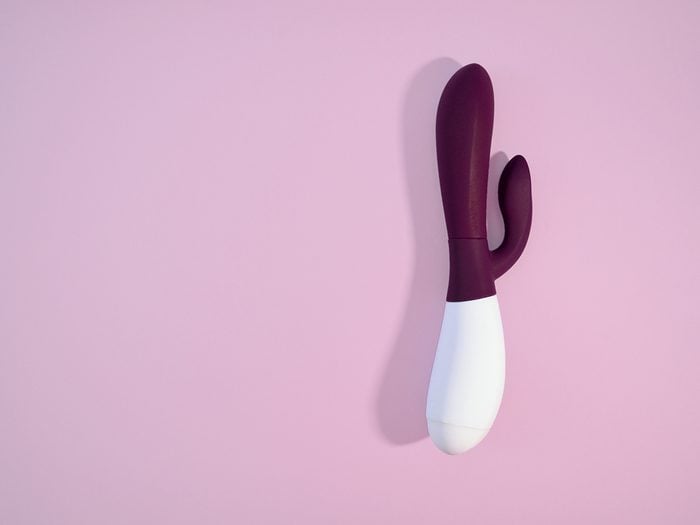Can a Vibrator Desensitize You?

We asked two experts if using your favourite toy too much can lead to less satisfying sex with a partner.
“A billion husbands are about to be replaced,” wrote Chuck Palahniuk in his 2014 novel Beautiful You. The book told a tale of what could happen when women abstain from daily life in order to spend night and day alone with…their vibrator. Now, this is ridiculous on many levels, but let’s unpack one particular myth here that’s been lurking around since the ’80s, when sex toys went mainstream: The idea that frequent use of a vibrator can make sex with a partner less pleasurable, as it could cause what has repulsively been called “dead vagina syndrome.”
If you’ve ever found—and I hope you have—a device that vibes you exactly how you like, and have found yourself using it frequently, perhaps you too have contemplated if you could be using it “too much.” According to plenty of Reddit threads, many people are asking this very same question. They wonder: Have their bodies been conditioned to only be able to reach completion with their little device?
Before answering that, it’s helpful first to understand exactly how a vibrator does what it does. When you’re aroused, blood flow rushes to the genitals, and the clitoris and vaginal walls (or the penis) swell with blood. This means the tissues become engorged, and more nerve endings (the pleasure signifiers) are exposed, which can lead to greater sensitivity and one hell of an orgasm.
(Related: Why Squirting Orgasms Are a (Really) Good Thing—And How to Have One)
“Your clitoris is the sole organ in your body whose only function is totally for pleasure,” says Gabrielle Landry, a Montreal-based doctor who specializes in sexual wellness. “It has about 8,000 nerve endings, which is twice as much as the penis—that’s a lot of nerves, all reacting to different stimuli.”
Is it possible for all these little nerves to be desensitized by a vibrator? I’m happy to tell you, no. Landry says not a vibrator nor sex with a partner can desensitize you. In fact, desensitization is a serious condition that involves permanent nerve-ending damage. Although you may feel numbness for a few minutes after stimulation, a vibrator can’t cause that kind of injury, says Toronto-based sexologist Jess O’Reilly.
There’s data to back it up: According to a 2009 Journal of Sexual Medicine report that examined vibrator use among 2,056 women in the U.S., about 72 percent said they’d never experienced desensitization, and about 17 percent said they’d noticed just a mild and brief desensitization.
So, what if, as you’ve come to use your vibrator more often, you’ve found it more difficult to orgasm without it? Well, that’s not your body developing an addiction to it or a distaste for your partner. That’s just you figuring out what gets you off better.
(Related: Where Did My Sex Drive Go?)
“It may be that you simply prefer the sensations of a vibrator and find vibrations more conducive to orgasm,” says O’Reilly. “I often compare vibrators to contact lenses and glasses; you may feel as though you see clearly without them, but once you start using them to enjoy 20/20 vision, you may find that seeing without them simply isn’t as clear.”
Landry often hears this concern from her patients but agrees with O’Reilly. “It’s about understanding the way you need to be touched and how your body reacts to certain stimuli,” she says. “What I’ve found is sometimes women feel they have more time and comfort in using toys on their own, and that gives them the space to know exactly how to please themselves.”
One 2017 study found that using a vibrator has positive sexual benefits. It can help you relax and inspire creativity in the bedroom, which can lead to higher levels of desire and arousal, improving sexual function, satisfaction and distress.
Now if that’s the case, how did the myth that vibrators can “ruin” sex with a partner for you come to exist? As with many fears and phobias surrounding women and sex, there may be misogyny at play.
“I wonder if this [idea] is rooted in expectations of what sex ought to be—penetrative, orgasm-focused, always a perfect 10, exhilarating,” says O’Reilly. “Some of these expectations are tied to a heteronormative gender binary that suggests our bodies must respond universally to specific acts.”
But there’s no one specific way to have sex. You know what gets you off, and what or who does it best. If that’s your vibrator, by all means, go at it as often as you like—and definitely consider using it when you have sex with your partner, too. Besides, the better you get to know your handy little device, the better your sexual function and satisfaction.
Next: Are You Cleaning Your Sex Toys the Right Way (and Often Enough)?




